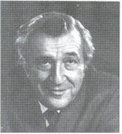Wiesner, Jerome B.

Jerome B. Wiesner became the 13th president of the Massachusetts Institute of Technology (MIT), Cambridge, Massachusetts, on July 1,1971, after serving as a faculty member for 25 years. He is a former dean of the MIT. School of Science, and, prior to assuming the presidency, was the university's senior academic officer with the title of provost.
From February 1961 to February 1964, Dr. Wiesner was science advisor, first to President John F. Kennedy, and then, for a short time, to his successor, President Lyndon B. Johnson. He also serves as a member of the Massachusetts Science and Technology Board, to which he was appointed in 1970. And, in 1974, he was named to the Technology Assessment Advisory Council of the Office of Technology Assessment of the U.S. Congress, and was elected chairman in 1976. Thus, as a public official and a private citizen, he has participated in the shaping of national policies and programs relating to science and technology, and for many years he has advocated international negotiations with a view toward effective controls and limitations on nuclear armaments as a deterrent to nuclear war.
Within the scientific community, Dr. Wiesner is recognized as an authority on microwave theory, communications science and engineering, and radio and radar propagation phenomena, as well as on matters of science policy and technical education. He was a leader in the development of radar during World War II, and later in the conception of radio transmission by scatter techniques from the earth's ionosphere.
Born in Detroit, Michigan, May 30, 1915, and raised in Dearborn, Michigan, he attended the University of Michigan at Ann Arbor, receiving B.S. degrees in electrical engineering and mathematics in 1937, the M.S. degree in electrical engineering in 1938, and the Ph.D. degree in electrical engineering in 1950. While at the university, he was associate director of the school's radio broadcasting service and also assisted in the development of electronic techniques for use in the Speech Correction Department. In 1940, he was appointed chief engineer for the Acoustical and Record Laboratory of the Library of Congress in Washington, D.C.
Dr. Wiesner joined the research staff at MIT's newly formed Radiation Laboratory in 1942, and soon became associate leader of the Radio Frequency Development Group. He later became project engineer for a key radar development program, and then leader of Project Cadillac, which was assigned the development of an airborne radar system. In 1945, he transferred to the University of California's Los Alamos, N. Mex., Laboratory, but returned to MIT. in 1946 as assistant professor of electrical engineering. He was advanced to associate professor in 1947 and was made a full professor in 1950. From 1952 to 1961, Dr. Wiesner was director of MIT's Research Laboratory of Electronics, which grew out of the Radiation Laboratory as a multidisciplinary, interdepartmental center for broad basic research in electronics, physics, and communications, and, in 1959-60, was also acting head of the Electrical Engineering Department. He assumed the post of provost in 1966, and, in addition, held the faculty title of Institute Professor (MIT's highest faculty rank) from 1962 until he became president in 1971.
The recipient of several honorary doctorates as well as a prolific author, Dr. Wiesner is a Fellow of the Institute of Electrical and Electronics Engineers and the American Academy of Arts and Sciences. He also is a member of a number of other professional societies -including the National Academy of Engineering and the honorary engineering societies, Tau Beta Pi and Eta Kappa Nu. He was awarded the Presidential Certificate of Merit in 1948 for outstanding service to the United States.
Dr. Wiesner is married to the former Laya Wainger, whom he met while both were students at the University of Michigan; they have four children. Mrs. Wiesner has long been active in civic affairs in the Boston area. She was one of the organizers of the Workshop on Women in Science and Technology. This conference led to the establishment of the MIT Project for Work in Technology and Science, whose purpose is to provide effective guidance concerning careers in mathematics, science, and engineering to students on the secondary level. (Editor's Note: Dr. Wiesner passed away on 21 October 1994.)
Dr. Wiesner is the 1977 Founders Medal Recipient "For leadership and service to the nation and the engineering and scientific professions in matters of technical developments, public policy and education."
| Disclaimer: This article is taken wholly from, or contains information that was originally published by, the Institute of Electrical and Electronics Engineers, Inc.. Topic editors and authors for the Encyclopedia of Earth may have edited its content or added new information. The use of information from the Institute of Electrical and Electronics Engineers, Inc. should not be construed as support for or endorsement by that organization for any new information added by EoE personnel, or for any editing of the original content. |